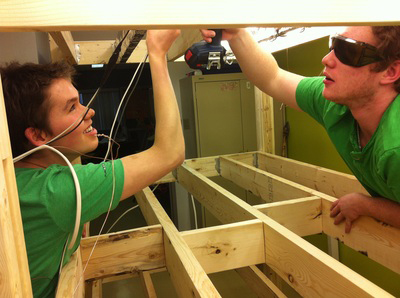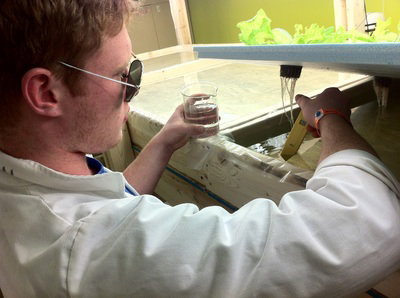When four students at Mecatina School started growing hydroponic lettuce and herbs as their entry in the Québec Entrepreneurship Contest, they joked with teacher Chris Wong about one day supplying the entire Lower North Shore with fresh produce. Just a few months later, they’ve shown how viable that idea could be.

Mecatina School students with teacher Chris Wong
The village of La Tabatière (population 450) where Mecatina School is located is not accessible by road. When produce arrives by boat or plane, it is already a week old, wilted and—at $4.15 for a head of lettuce—expensive. That less-than-ideal situation prompted the students to launch their extra-curricular hydroponic venture, aptly named “GrEAU.” With operations up and running since March, they are already selling 30 heads of organic romaine lettuce weekly through the village’s two grocery stores. At $3.50 a head, not only is their produce competitively priced, it is of far superior quality.
The students—two of whom are in Secondary III and two in Secondary V– also produce fresh basil, chives and dill, as well as two dozen bottles of pesto weekly. To encourage residents to buy the fresh herbs—no one cooked with them before because they weren’t available—they come with recipes and instructions for storing and drying them.
Extra lessons after school

Students built and wired their hydroponic station.
From the moment science and technology teacher Chris Wong posted information about the Québec Entrepreneurship Contest that first attracted his students’ attention, he has been a constant support to them. “We brainstormed other ideas like some sort of retail service,” says Chris, “but we thought it would be of more value to the community to actually produce something locally.” To help the four young entrepreneurs develop their business plan, he gave them extra lessons after school geared to this single project. They covered everything from seed generation to calculating the amount of electricity their operation would consume. With a start-up loan approved by the school’s Governing Board, students and teacher constructed a hydroponic growing station in an unused closet at the back of their classroom.
“You confirmed everything we thought
this could be . . .”
If initially the students were motivated by a desire to compete in the contest, “they understood pretty early on in the project the impact it could have on the community and they really wanted to make it successful,” says Chris. Indeed, as their contest application states, their goal was much broader than simply making money. “We wanted to prove a concept, the viability of this business project as a legitimate source of revenue and jobs for our community . . . We have shown that with a 48 sq. ft. footprint we were able to pack 192 sq. ft. of growing space producing fresh organic lettuce that is pesticide and herbicide free in the middle of one of the harshest northern winters we’ve experienced in many years.”
 The project has been a learning experience for all concerned. The students immediately involved “see how science and technology can be applied to different industries,” says Chris. “It has shown them the practicality of what they are learning.” In his classroom, he uses the project as an example of how academics can be applied to real-world concerns. “If we’re talking about electricity, I can refer to a specific task we had to do with the project.”
The project has been a learning experience for all concerned. The students immediately involved “see how science and technology can be applied to different industries,” says Chris. “It has shown them the practicality of what they are learning.” In his classroom, he uses the project as an example of how academics can be applied to real-world concerns. “If we’re talking about electricity, I can refer to a specific task we had to do with the project.”
 Letter from the mayor
Letter from the mayor
Both CBC Radio, Ici Radio-Canada and other local media have reported on the students’ success, and a letter from the mayor of Gros Mecatina sums up the community’s reaction. For the past three years, he writes, the community has been considering various agricultural alternatives as a means of diversifying its economy. “I guess you can understand my amazement and awe to see what a teacher and students can do in a small room. You confirmed everything we thought this could be only you did it in the dead of winter!”

Testing the water’s pH balance.
While Chris himself will be leaving La Tabatière at the end of this school year, he isn’t worried about the project’s sustainability. “We already have volunteers for next year and a teacher willing to supervise. And the students have planned how they will keep the operation going over the summer. I’ve learned how much a project like this can motivate students,” he adds. “We’ve had students who don’t normally participate in extra-curricular activities coming by to see what’s going on and lend a hand.”
Everything you’d want to know about “GrEAU”
Learn more about how these Mecatina School students and teacher set up a successful hydroponic operation at http://greau.weebly.com/

Comments are closed.